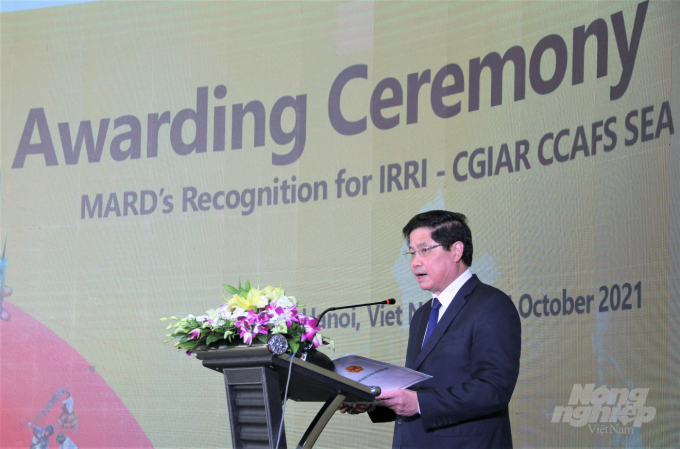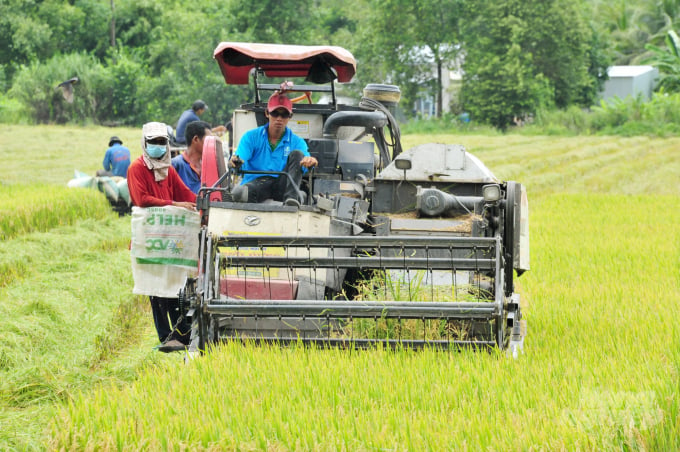November 27, 2025 | 11:54 GMT +7
November 27, 2025 | 11:54 GMT +7
Hotline: 0913.378.918
November 27, 2025 | 11:54 GMT +7
Hotline: 0913.378.918
The activities of the Research Program on Climate Change, Agriculture and Food Security (CCAFS) in Southeast Asia has offered lessons and recommendations for the Vietnamese agricultural sector and farmers in responding and solving climate change challenges.
After its successful ten-year run in the region, the CGIAR Research Program on Climate Change, Agriculture and Food Security (CCAFS) organized the Closing Conference of CCAFS Southeast Asia on 26 October 2021.

Deputy Minister of Agriculture and Rural Development Le Quoc Doanh addresses the awarding ceremony on MARD's Recognition for IRRI-CGIAR CCAFS in Southeast Asia. Photo: Pham Hieu.
Since its inception in SEA in 2013, CCAFS implemented activities promoting climate-smart agriculture (CSA) as a tool to address the increasing impacts of climate change.
Hosted by the International Rice Research Institute (IRRI) – Vietnam Office, CCAFS SEA has done various interventions with its partners in its several priority countries, such as Cambodia, Indonesia, Laos, Myanmar, Philippines, Thailand, and Vietnam.
In the meeting, Dr. Bjoern Ole Sander, IRRI’s Country Representative to Vietnam, shared the advanced rice production technologies such as alternate wetting and drying, low-emissions straw management, and post-harvest management, etc. which reduces GHG emissions while improving productivity and climate resilience.
These techniques have been scaled successfully in the Mekong River Delta region, helping tens of thousands of farmers.
In addition, the innovative tools that IRRI-CCAFS has developed would further contribute to the development of a measuring - reporting - verifying system for GHG emissions in agriculture and support agriculture policy and planning to achieve Vietnam's mitigation commitments in agriculture.
Speaking at the conference, Vietnamese deputy Minister of Agriculture and Rural Development (MARD), Le Quoc Doanh said that the activities of the CCAFS in Southeast Asia had recommended the Vietnamese agricultural sector and farmers in responding and solving climate change challenges via the development and replication of smart agricultural solutions, saving resources, reducing greenhouse gas emissions, increasing the values of crop and livestock production.
As a result, it had contributed to building a high-tech, sustainable and resilient agricultural industry to market and climate fluctuations, said Doanh.

The activities of the CCAFS in Southeast Asia helps promote smart agricultural solutions in Vietnam's agriculture. Photo: Le Hoang Vu.
According to the deputy minister, one of the great achivements of the co-operation between Vietnam’s MARD and the CCAFS SEA was to successfully set up and apply the Climate-Smart Maps and Adaption Plans (CS-MAP) for 43 provinces and cities across the country.
The results of CS-Map application in the Mekong Delta showed that adjusting the sowing schedule had helped farmers avoid the adverse effects of drought and saltwater intrusion that often occur in the winter-spring, the deputy minister said.
The CS-MAP application which was completed and successfully launched at the conference on October 19 were received positively and proposed to continue developing to the district and commune levels and expanding to all 63 provinces.
The Ministry of Agriculture and Rural Development had also shared CS-MAP application at international dialogues and forums within the framework of the United Nations Summit on Food System (UNFSS) and was expected to be introduced at the 26th UN Climate Change Conference of the Parties (COP26) in the United Kingdom.
Doanh also highly appreciated the establishing and implementing seven Climate-Smart Villages (CSV), which served as a multisectoral platform for testing the technological and institutional options for climate change adaptation and mitigation in agriculture.
Translated by To Nhu
/2025/11/26/4909-2-154329_878.jpg)
(VAN) Pearl grouper farming in HDPE cages not only delivers economic efficiency but also contributes to protecting the environment, creating jobs, and promoting marine-based experiential tourism.

(VAN) The model of making a living under the forest canopy through the agroforestry system in Van Son commune, Bac Ninh province, is expected to generate an annual income of approximately VND 30 million/ha.

(VAN) Many enterprises in Can Tho are harnessing natural energy and reducing greenhouse gas emissions in their production processes, thereby contributing to the promotion of a sustainable green transition.
/2025/11/24/3536-2-112800_176.jpg)
(VAN) Dong Nai now has tens of thousands of hectares of forests certified for sustainable management, and this area will continue to be expanded in the coming period.

(VAN) Vinh Ha hamlet (Dai Xuyen commune, Hanoi) is shifting away from small-scale farming as households adopt bioscurity into their breeder chicken models.

(VAN) Heavy rains make aquatic species more vulnerable to disease. Proactive water management and high-tech systems help farmers prevent outbreaks and protect yields.

(VAN) Greenhouses are shifting production mindsets in Binh Lu commune, enabling farmers to ‘weather the sun and rain’ and secure stable vegetable harvests throughout the year.